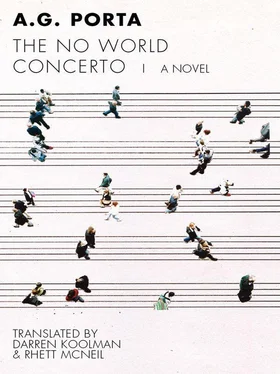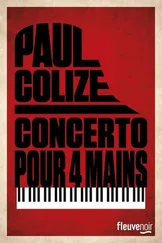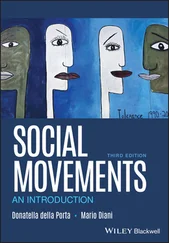The screenwriter’s schedule is all over the place: perhaps the principles of atonality have begun sinking in. He’d been working from dawn until late in the morning then went to the kiosk to buy a newspaper from his native country. Now, he’s sitting at the café in the plaza. He gets the impression that, here in the neighboring country’s capital, there are people who spend all day in the cafés — some reading their newspapers, others who bring their offices to the tables along the sidewalk. The waitress continues ignoring him, so the screenwriter takes his notebook from his jacket pocket. He also utilizes the café as a temporary office, although he drinks his coffee while he works, unlike some others, who only work while drinking their coffee. After considering the difference between these two options, he asks himself if he’d be able to make the café his permanent workplace. It’d be cheaper than renting an office or an apartment. He takes a look around. Maybe he’d feel uncomfortable, be distracted by all the noise and bustle. A few meters in front of his table, a guy is unloading bottled drinks from a truck; a little farther on, he sees a dry-cleaner’s van, and beyond that, a girl in uniform cleaning the fountain in the center of the plaza. There’s no doubting it, he’d never be able to concentrate here. He can only do so now because of the one idea that happens to be preoccupying him. Supposing twelve-tone music was never invented, the girl says to her father, what do you think would exist in its place? He doesn’t know what to say, why would anyone care about such things? The girl’s fingers putter aimlessly along the piano keys, as if probing for something new and original. She’s abandoned her piano practice and seems to be having a hard time keeping the conversation going. The screenwriter is trying to pin down the father accurately, but his character’s elusive. In summary, he seems to be a man who no longer believes in anything or anyone; a character who, over a long period of time, has given up a lot of ground, bottled up his pride, suppressed his ideas, compromised his principles, become passionless, and were he pressed to admit a belief in anything at all, he’d say it was money. Now that he’s rich, maybe he’s becoming regretful; maybe the past is beginning to catch up with him. The screenwriter scribbles the idea in his notebook, although he doesn’t know whether he’ll end up using it. Perhaps it’s time to lay the groundwork. McGregor speaking, he writes down in a flurry. For some reason, the girl answers a phone call intended for her father. And so the stranger introduces himself: McGregor speaking. The screenwriter closes the notebook, sighs contentedly, and asks the waitress for the check, giving her one of his very best smiles. She continues ignoring him. She’ll come around yet, he tells himself, and leaves a generous tip. You’ve no idea who you’re dealing with, he murmurs as he gets up to leave, and pushes the chair back in its place.
The screenwriter returns late from his morning stroll. His body clock is off because he stayed up working until the early hours of the morning. After buying his country’s newspaper on the corner of the boulevard, he drank coffee at the café in the plaza, went for a stroll along the river, and dined in the afternoon. Now, he takes a short break before sitting at his desk to resume writing. He thinks about the young orchestra conductor and the brilliant composer, characters that should feature more prominently. But something always thwarts him when he sets out to concentrate on them. He opens the window and glances unconsciously at the building across the street. The days are becoming repetitive, each one resembling the next, and it occurs to him that maybe his characters should perceive the passage of days similarly. He has a god’s eye view of the sunset, of the people passing in the street below, and he wonders about the girl, about what she may be doing at this moment. Maybe she’s at a rehearsal; maybe she’s reading the philosopher W with the young conductor of the orchestra. Or perhaps they’re kissing. Or perhaps she’s kissing someone else entirely. For the screenwriter, the thought of the girl kissing someone else is arousing. He sees her neglecting her piano practice to work on her novel instead, scribbling away fervidly, and is reminded of himself when he was young, back when he first set out to become a screenwriter, when he too would neglect anything and everything for the sake of his work. Things haven’t turned out great for him, not as great as he expects they will for the girl. He’s written some good screenplays for movies that passed in and out of the cinema without notice, but he’s also written some truly awful screenplays, ones he’d like to forget, for movies that passed in and out of the cinema without notice. The woman in the building opposite passes her window; he raises his arm to attract her attention. He has no idea what he’ll say to her, but he’s come to regard her as something of an old acquaintance. But she doesn’t see him, and he lowers his arm. He’s had some success with women, he thinks. His marriage may have been a disaster, but he’s had some success with other women. The screenwriter is sitting on his bed staring at the telephone. It takes a concerted effort to resist the impulse to call his wife. He distracts himself with the newspaper, goes over the personals, and reads the articles he’d been saving for later that evening. The screenplay once more obtrudes upon his thinking, but he turns the page, determined to concentrate on his reading. There’s a photo the girl will get a kick out of, he tells himself: the star of her favorite soccer team on some distant beach doing tricks with a ball to impress a bevy of onlookers. He’s done pretty okay with women, he muses to himself in another lapse of concentration, because the type of work he does confers on him a certain intellectual cachet. He believes himself reasonably attractive, but he knows this alone isn’t enough. So he puts on airs, affects a cerebral pose to appear more interesting than he is. He puts the newspaper to one side, lies back on the bed, and looks at the ceiling. He knows what it is to be a failure. He’d liked to have experienced success, to know what it feels like to triumph at something. What does it mean to be a winner? He can’t define it without reference to money and women. Years before, he’d have been able to sublimate his belief, qualify it by succeeding at various other things, but at his age, he can no longer deceive himself. Most people want success, but only a few ever manage it, because only a few people have the necessary strength, the self-confidence — indeed, the necessary selfishness — besides so many other qualities, to succeed; qualities the screenwriter sees in the young orchestra conductor, a character he’s yet to fully develop, but who’s shown indications of being someone who knows exactly what he wants, the kind of person who could go far in the music world, or in any world he chooses for that matter. He sees him as a winner, a precocious young man with a talent for bringing together disparate notions, and with a gift for getting along well with others. The future abounds with opportunities for such a character. A pity his role is so small, almost an extra compared with the girl’s. And yet, he must worry about success as well, about money, which will probably come much later for him, when he’s no longer young, after years of dragging himself on and off stages, having become jaded with women, and can only vaguely remember his salad days. What does it mean to be a winner? It only intimidates the girl — her fear of mediocrity, of writing like everyone else, of becoming complacent, selling out for fame. . but she’s already famous. Perhaps she doesn’t appreciate it since it happened so soon; or perhaps the piano’s become a millstone around her neck. Maybe if she wasn’t so well known. . the truth is he doesn’t know what it means to be a winner. Maybe luck has something to do with it, he finally says, as his eyes begin to close, not wanting to see himself as the loser of a long-distance race he began so long ago.
Читать дальше












